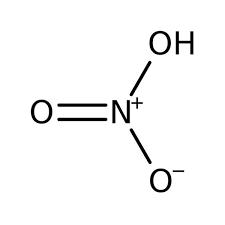Nitric Acid AR Grade for laboratory r&d chemical
Nitric acid, with the chemical formula HNO3, is a highly corrosive and reactive mineral acid. It is commonly known as aqua fortis, Latin for “strong water,” due to its potent nature. Nitric acid is composed of hydrogen, nitrogen, and oxygen, and it exists as a colorless liquid in its pure form.
The production of nitric acid involves the oxidation of ammonia (NH3) using the Ostwald process. In this process, ammonia is first oxidized to nitrogen dioxide (NO2), which is then further oxidized to nitrogen oxide (NO). The nitrogen oxide reacts with water to form nitric acid and is often concentrated to obtain commercial-grade solutions of the acid.
Nitric acid is a key component in the manufacturing of various products, making it an essential industrial chemical. One of its primary applications is in the production of fertilizers, where it is used to produce ammonium nitrate, a nitrogen-rich compound crucial for plant growth. Additionally, it plays a vital role in the production of explosives, including dynamite and TNT.
Another significant application of nitric acid is in the dye and pigment industry, where it is employed to manufacture various dyes and colorants. Its strong oxidizing properties are useful in the synthesis of organic compounds and as a reagent in chemical laboratories for qualitative and quantitative analysis.
However, nitric acid is highly corrosive and must be handled with extreme caution. It can cause severe burns and irritation to the skin, eyes, and respiratory system. Diluted solutions are often used in laboratories, while concentrated forms are employed in industrial processes.
Proper storage and handling of nitric acid are essential to prevent accidents and ensure safety. The acid should be kept in well-ventilated areas, away from incompatible substances and sources of heat or ignition.
In summary, nitric acid is a powerful and versatile chemical widely used in industrial applications, ranging from fertilizers and explosives to dyes and chemical synthesis. Its strength and reactivity make it an essential component in various manufacturing processes, but its handling requires careful attention to safety protocols due to its corrosive nature.
Alkemist | Pakistan No:1 r&d chemicals Solutions Provider

Reviews
There are no reviews yet.